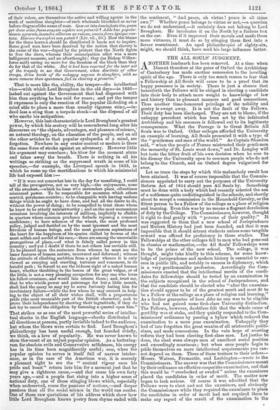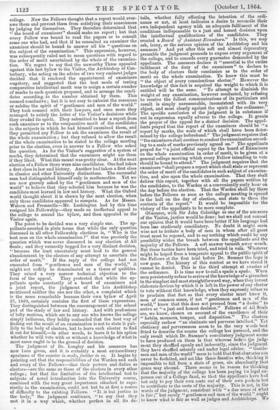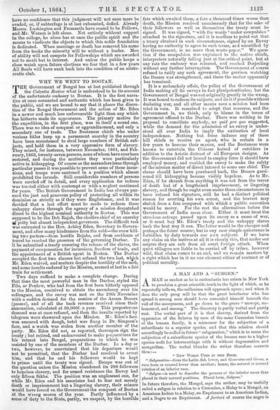THE ILL SOULS' JUDGMENT. A NOTHER landmark has been removed. At
a time when Dissent thunders at the gates of Oxford the Archbishop of Canterbury has made another concession to the levelling spirit of the age. There is only too much reason to fear that a Fellowship at All Souls will cease to be a proof that its happy possessor is in society. There is just a chance that henceforth the Fellows will be obliged in electing a candidate into their body to attach more weight to knowledge of law and history than to pleasant manners and good connections. Thus another time-honoured privilege of the nobility and gentry is swept away. It is not the fault of the Fellows. Their duty has been discharged. They are not to blame, if the unhappy precedent which has been set by the infatuated Archbishop and his assessors is followed out to its legitimate consequences. What the Peerage is to Great Britain All Souls was to Oxford. Other colleges afforded the University an example of learning, All Souls presented it with a type of the "gentleman and man of the world." As Captain Shand= said, " when the people of France mistrusted their gentlemen the monarchy of St. Louis went down," and Dr. Longley will but taste the bitter fruit of his own decision when be sees to his dismay the University open to common people who do not belong to the Church, and an Oxford degree vulgarized for ever.
Let us trace the steps by which this melancholy result has been attained. It was of course impossible that the Commis- sioners appointed to carry out the purposes of the University Reform Act of 1854 should pass All Souls by. Something must be done with a body which had recently selected the son of a nobleman quite undistinguished in the schools, and shortly about to accept a commission in the Household Cavalry, as the fittest person to be a Fellow of the college as a place of religion and learning. Even this was by no means a flagrant dereliction of duty by the College. The Commissioners, however, thought it right to deal gently with "persons of their quality." It was suggested to them that a new school of Jurisprudence and Modern History had just been founded, and that it was impossible that it should attract students unless some tangible reward was offered for proficiency in those studies. The Fellowships at the other colleges fell to men who had gone out in classics or mathematics,—the All Souls' Fellowships were to be the prizes of the new school. The college, it was thought, might take kindly to this scheme, for some know- ledge of jurisprudence and modern history is essential to suc- cess in public life, and notably to success in diplomacy, which is a very gentlemanlike profession. Accordingly the Com- missioners enacted that the intellectual merits of the candi- dates for fellowships should be tested by an examination in the subjects recognized in the school of Jurisprudence, and that the candidate should be elected who "after the examina- tion should appear to be of the greatest merit and most fit to be a Fellow of the college as a place of religion and learning." Is a further guarantee of bona fides no one was to be eligible who had not gained some first-class University distinction. The Fellows, however, doubtless felt that the whole cause of gentility was at stake, and they quietly responded to the Com- missioners' ordinance by passing a bylaw which reduced the examination to a mere pass examination. Unhappily they had of late forgotten the great maxim of all aristocratic politi- cians, and made concessions. In the vain hope of averting reform they had been electing first-class men. Let justice be done, the elect were always men of excellent social position and exceedingly courteous ; but when once people begin to pride themselves on mere intellectual acquirements you can- not depend on them. Three of these traitors to their orders— Messrs. Watson, Fremantle, and Lushington—wrote to the Commissioners. The answer was that the Commissioners meant by their ordinance an effective competitive examination, and that this would be "overlooked or evaded" unless the examiners placed the candidates in order of merit. The matter now began to look serious. Of course it was admitted that the Fellows were to elect and not the examiners, and obviously the Commissioners while they required the examiners to place the candidates in order of merit had not required them to make any report of the result of the examination to the the college to amend the bylaw, and then appealed to the Of-course, with Sir John Coleridge as one of the assessors Visitor again. of the Visitor, justice would be done ; but we shall not conceal • The point to be decided was a very simple one. The ap- our opinion that it would have been'better if his language had pellants asserted in plain terms that while the only question been lass studiously conciliatory. No doubt it might seem discussed in all other Fellowship elections is, "Who is the wise not to irritate a body of men in whom after all great best man on the whole examination ?" that was precisely the trust must be reposed, and to say nothing which could by any question which was never discussed in any election at All Possibility widen the breach between the appellants and the Souls ; and they earnestly begged for a very distinct decision, majority of the Fellows. A soft answer turneth away wrath. "because the least uncertainty must lead to the general But these tactics have been tried, and tried in vain. Whatever abandonment by the electors of any attempt to ascertain the might be hoped from a temperate appeal to the public spirit of order of merit." If the reply of the college had not the Fellows at the first trial before Dr. Sumner the hope is emanated from "gentlemen and men of the world," it now gone. The history of this contest as we have stated it might not unfitly be denominated as a tissue of quibbles. cannot be denied. This is the third attempt at evasion Of They raised a very narrow technical objection to the the ordinance. It is time now to call a spade a spade. When form of the appeal. They protested that while the ap. men persistently refuse to arrive at the knowledge of a given fact pellants spoke constantly of a board of examiners and in the simplest and most straightforward way, when they invent a joint report, the judgment of the late Archbishop elaborate devices by which it is left in the power of any elector mentioned neither the one nor the other, a complaint which to vote without that knowledge, when they expressly refuse so is the more remarkable because their own bylaw of April to proclaim that fact as that every elector must know it, 27, 1859, certainly contains the first of these expressions. men of common sense, if not "gentlemen and mmi of the They distinguished between the encouragement of the school world," know that this does not proceed from "a desire' to Rd of the study of law and history. And with professions arrive at "a just and honest decision." Fellows of All Souls of lefty motives, which are to any one who knows the college are, we know, chosen on account of the excellence of their simply ludicrous, they boldly contended that the best way of "habits, manners, temper, and disposition." The electors finding out the result of an examination is not to state it pub- especially eschew " an obstinate and perverse intellect." Yet hely to the body of electors, but to leave each elector to find obstinacy and perverseness seem to be the very wards best it out for himself,—in other words, to leave it to his option fitted to describe the course the college has pursued, and the whether he will vote with or without a knowledge of what in only result which Dr. Sumner's conciliatory judgment seems most eases ought to be the ground of decision. to have produced on them is that whereas before film judg7 The judgment of Dr. Longley and his assessors has ment they shuffled openly and indecently, since the judgment now keen given, and it is certainly a most extiaordinary they have shuffled astutely and under legal advice. " Gentle. specimen of the suauiter in mode, fort iter in re. It begins by men and men of the world" seem to hold that that character can pointing out that the responsibilities of the Warden and each never be forfeited, and net like those fanatics who, thinking it and every of the Fellows—that their powers and duties as impossible to fall from a state of grace, sin abundantly that electors—are the same as those of the electors in every other grace may abound. There seems to be reason for thinking college ; but that the limitation of the intellectual, test to that the majority of the college has been paying its legal ex subjects of novel introduction into the University course, penses out of a College fund, so that the appellants have had combined with the very great importance attached to rape- not only to pay their own costs out of their own pockets but riority in the examination, could not but be at first a source to contribute to the costa of the majority. This is not, in the of difficulty to the existing Fellows. "It is but justice to words of the judgment, consistent with "a due sense of what the body," the judgment continues, "to say that they is fair ;" but surely "gentlemen and men of the world" ought met it in a way which, whether perfect in all its de- , to know what is fair as well as judges and Archbishops. We college. Now the Fellows thought that a report would over- tails, whether fully effecting the intention of the ordi- awe them and prevent them from satisfying their consciences nance or not, at least indicates a desire to reconcile their by judging for themselves. They therefore determined that own independent agency with an adequate fulfilment of the " the board of examiners" should make no report ; but that conditions indispensable to a just and honest decision upon every Fellow was bound to read the papers or to consult the intellectual qualifications of the candidates. They some one who had, and that if he consulted an examiner the created a Board of Assistant-Examiners." Is this, we may examiner should be bound to answer all his " questions on ask, irony, or the serious opinion of the Archbishop and his the subject of the examination." This expression, however, assessors ? And yet after this soft and almost deprecatory was subsequently ruled not to mean questions with regard to preamble the judgment proceeds to expose every argument of the order of merit ascertained by the whole of the examine- the college, and to concede every guarantee demanded by the tion. We regret to say that the unworthy Three appealed appellants. The assessors declare it " essential to the entire against this last bylaw to the Visitor, the Archbishop of Can. fulfilment of the duty of the examiners" to declare to terbury, who acting on the advice of two very eminent judges the body of electors their conclusion as to the order of decided . that it rendered the appointment of examiners merit on the whole examination. To know this must be nugatory, and suggested that the best mode of testing " the object of every conscientious elector." However the comparative intellectual merit was to assign a certain number knowledge of this fact is acquired tike weight to which it is of marks to each question proposed, and to arrange the candi entitled will be the same. " To attempt to diminish the dates according .to the number obtained by them. This weight of any examination, however conducted, by refusing seemed conclusive ; but it is not easy to exhaust the resources to receive the fullest communications of its particulars and or subdue the spirit of " gentlemen and men of the world." result is simply unreasonable, inconsistent with its very They took counsel with their lawyers, and once more they object, and most clearly against the spirit of the ordinance." managed to satisfy the letter of the Visitor's decisions while The specific conclusion of the judgment is in substance if they evaded its spirit. They submitted to hear a report from not in expression equally adverse to the college. It grants each examiner as to the comparative merit of the candidates the prayer of the appeal for a distinct decision. The appel- ia the subjects in which he had himself examined them, and lants prayed that the report of the examiners should be " a they permitted any Fellow to ask the examiners the result of report by marks, the scale of which shall have been deter- the whole examination ; but they refused to allow the result mined by the college beforehand." The judgment requires that of the whole examination to be stated to the college meeting "the examiners shall continue to conduct theexamination accord- prior to the election, even in answer to a Fellow who asked ing to a scale of marks previously agreed on." The appellants the question. As for the Visitor's suggestion of a system of prayed for " a joint official report by the board of Examiners marks, they determined that the examiners might use them on the whole examination in order of merit, to be given at a if they liked. What this meant was pretty clear. At the next general college meeting which every Fellow intending to vote election of a Fellow there were nine candidates. One had taken should be bound to attend." The judgment requires that the a first class in law and history. Another had taken a first class examiners "shall prepare a report which shall state or represent in classics and other University distinctions. The successful the order of merit of the candidates in each subject of exarnina- man had distinguished himself only in mathematics. Yet we tion, and also upon the whole examination. That they shall are now gravely asked by the "gentlemen and men of the deliver this report, together with all the papers written by world" to believe that they selected him because he was the the candidates, to the Warden at a conveniently early hour on candidate most learned in law, and history. What the Oxford the day before the election. That the Warden shall lay these world thought about it is shown by the next election, when before the Fellows as soon as the college meetinc,e is opened only three candidates appeared to compete. As for Messrs. in the hall on the day of election, and state to them the Watson and Fremantle—Mr. Lushington had by this time contents of the report." It would be impossible for the resigned his Fellowship—they made an ineffectual appeal to victory of the appellants to be more complete.
have no confidence that this judgment will not once more be evaded, or, if subterfuge is at last exhausted, defied. Already Messrs. Lushington and Fremantle have ceased to be Fellows, and Mr. Watson is left alone. Not entirely without support in the college, he alone has at once the public spirit and the means to vindicate the objects to which this noble foundation is dedicated. When marriage or death has removed his name from the books the minority will be without a leader. Men of ability will not compete for Fellowships which are awarded not to merit but to interest. And unless the public keeps a close watch upon future elections we fear that in a few years All Souls will have sunk back into the condition of an aristo- cratic club.
































 Previous page
Previous page